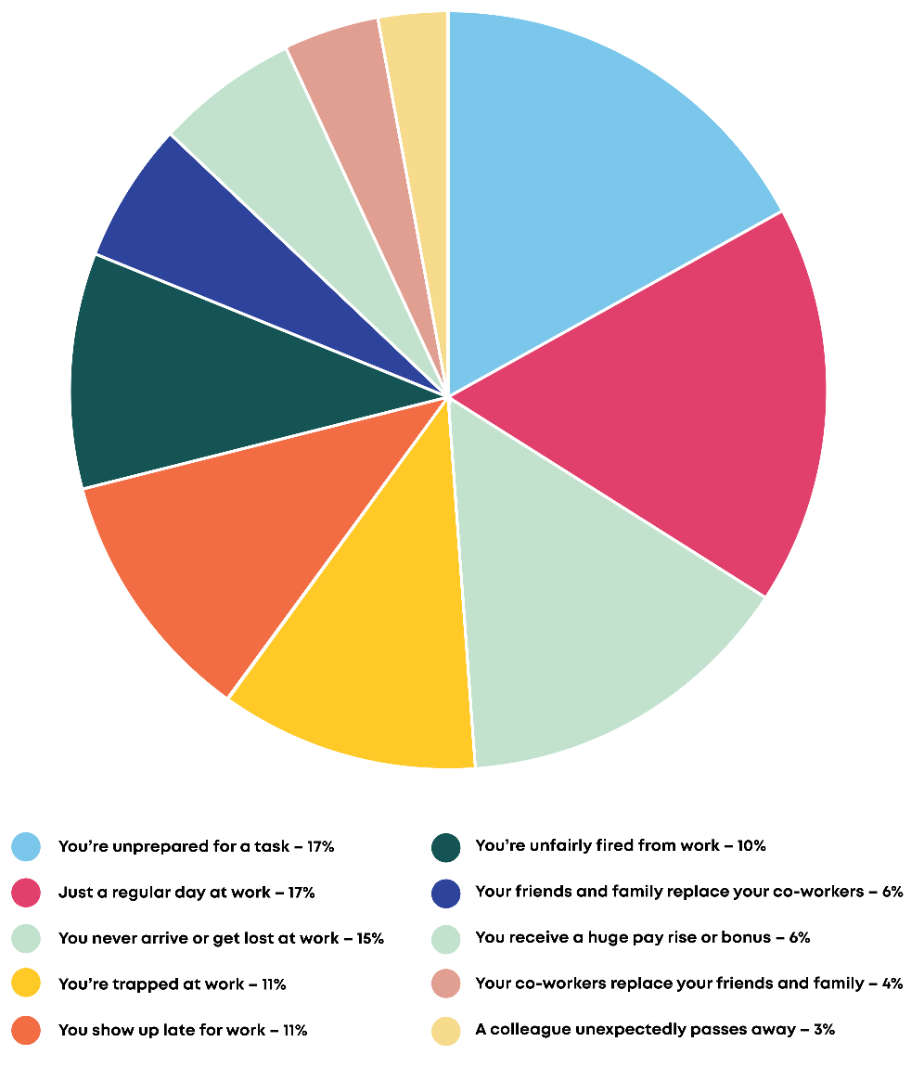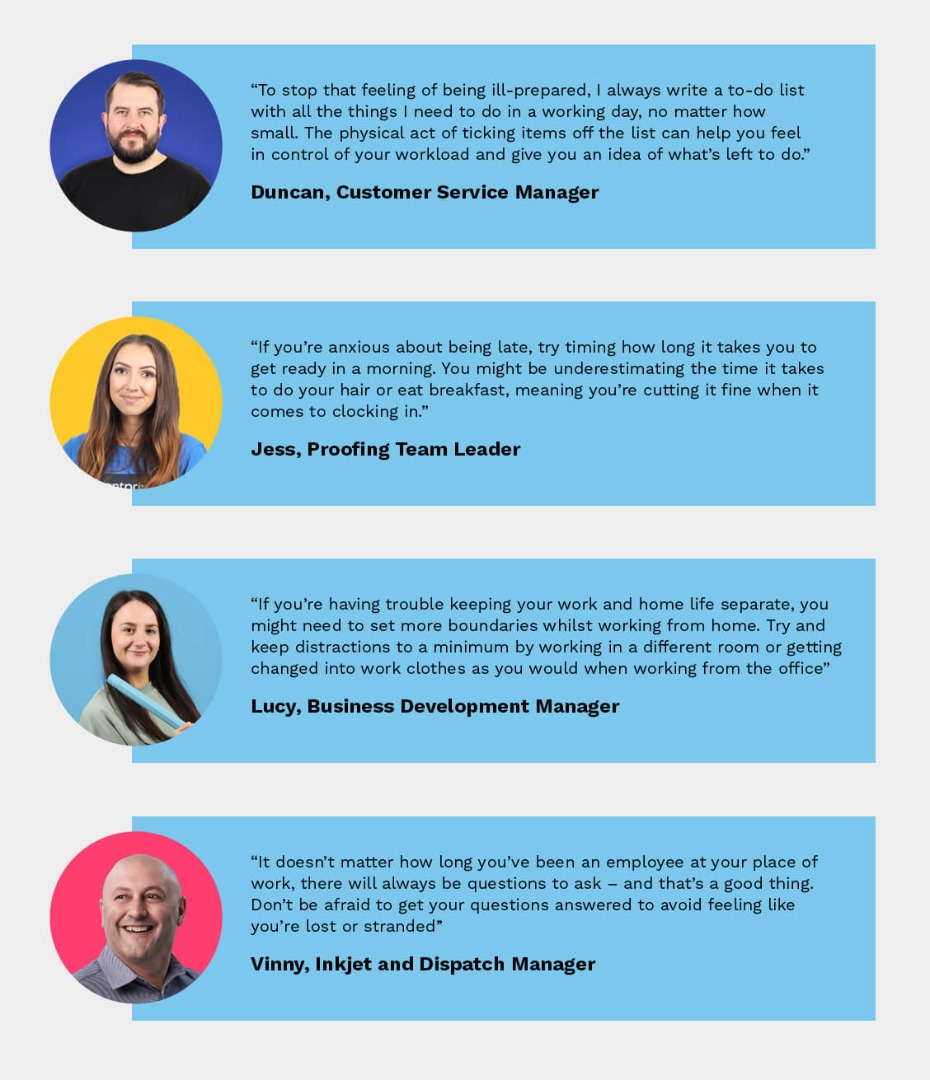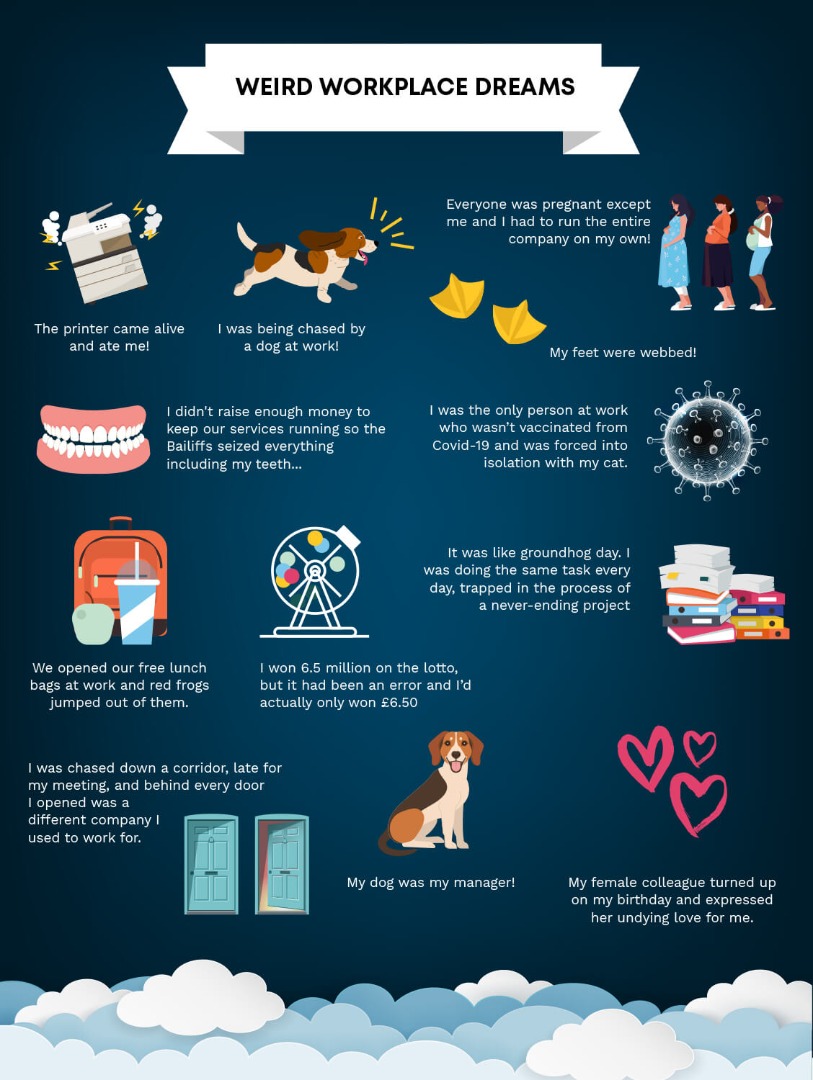We’re a chatty bunch here at instantprint – even while we’re working remotely, we’re making sure to get our catch-up time in. And the primary subject of our recent (virtual) office water cooler chat has been focused on one thing: our weird workplace dreams.
With 46.6% of UK workers now working from home, we wanted to know if our fellow remote workers across the country were noticing the same increase in dreams about work, what this might mean and how it’s affecting us – oh, and what some of the really weird ones were, because we’re nosy like that!
To delve deeper into this curiosity, we carried out a survey of 1000 UK office workers who’ve made the transition from office working to working from home and here’s what they had to say…
Dream or Nightmare?
Dreaming about work isn’t unusual. In fact, since March, 4 in 5 of us have visited the workplace whilst catching Zs.
What’s interesting, however, is that more than half of us are dreaming more about work since lockdown started, with a whopping 75% reporting that they’ve been experiencing workplace nightmares.
But do these nightmares have real-life implications? As it turns out, they do. In fact, 1 in 5 of us are actually thinking about quitting our job because of these bad dreams.
An Expert Opinion
To get to the bottom of this increase in weird work-related dreams, we spoke to Dr Sarah Jane Daly, a senior lecturer in social psychology from The University of Huddersfield.
She told us,
“For many of us, Covid-19 has brought work into our personal spaces. We think of home as a place where we can relax and shut out work-day stresses and strains. The fact that many people work from home now, means that our homes have become literal places of work. Kitchen tables, coffee tables, beds, sofas – all places that were once stress-free are now sites of work-production. Getting away from work has never been so difficult.”
Although this explains the subjects and themes of our workplace dreams, why are we dreaming more during lockdown?
Dr Sarah Jane Daly explains:
“Working from home often means that the shrill ring of our regular dependable alarm clocks to wake us up to catch that bus or beat the traffic to get to work has been side-lined and replaced by our natural body clock and alarm systems – not having to wake up early and spend twenty minutes putting our faces on means extra time asleep for us.
Whilst some individuals report more cases of insomnia in the current pandemic, for many, the quality of sleep may well be better than it ever was.”
What Are We Dreaming About?
On top of an increase in dreams (and in some cases, nightmares), we also noticed specific dream themes that were common to all of us, some more embarrassing than others.

Our survey results show that being unprepared for a task is one of the most common dream themes, with 17% of respondents claiming to have experienced this.
Much more favourable – although perhaps rather boring – is dreaming about a regular day at work, which a further 17% reported having dreamt of.
Similarly, never arriving (15%), getting trapped at (11%) and showing up late for work (11%) also rank highly. If we apply what Dr Daly has told us, is this our subconscious bringing our internal anxieties to light?
Interestingly, only 6% of us are dreaming of that long-sought-after pay rise or bonus.
So, we’re potentially getting better quality sleep during lockdown. But, why is our new-found slumber plagued with bad dreams?
Dr Sarah Jane Daly suggests:
“The pandemic has impacted on many people’s feelings of employment security and safety. Anxieties and concerns about potentially losing jobs and being unable to pay the rent/mortgage, putting food on the table, and paying for Christmas, trouble many on an almost daily basis.
This, alongside the threat of ourselves or loved ones contracting the Coronavirus all contribute to anxiousness and worriment playing out in our dream states.
Dreaming provides us with the space and time to process and playout our subconscious fears, to problem-solve and work through our subconscious issues.”
Top Tips from the instantprint Team

Yearning for Some Quality Catch-Up Time
When asked who the most common characters were in our weird work dreams, the overwhelming majority said their co-workers (47%). Our managers and the owners or directors of our companies featured in 11% and 12% respectively.
Gaining 22% of the vote, we’re also dreaming about our clients and customers.
Despite seeing our colleagues for less time due to working from home, they feature very heavily in our dreams. In our recent survey into the UK’s WHF habits, 36% of us agreed that our co-workers were the thing we missed the most about working in the office.
Is our loneliness manifesting itself in our dreams in the form of social interactions with the people we’re used to seeing every day? It’s possible.
Tackling Loneliness When Working from Home
We’ve employed a few different tactics when it comes to combating the loneliness employees can feel whilst working remotely. Here are some of the most successful ways we’ve kept in touch during lockdown.
1. A Meeting Without an Agenda
Planning in a meeting without an agenda once a week or every other week is a great way to encourage employees to take a break and catch up. Part of the secret to being such a close-knit team is how frequently we socialise together. For example, the marketing team has a half an hour video call lunch break together on a Friday to decompress after a week of hard work.
2. Remote Working Support Channel
One of the first things we did when lockdown was first announced back in March was to start a support channel on Slack. In this channel, people are encouraged to give tips about maintaining concentration, staying motivated and – well, keeping sane! – while working from home.
3. Regular Virtual Team Events
Even before lockdown, we hosted annual team events, like sports day, Easter competitions and, the event of the year, our Christmas party. We’ve tried to keep that spirit alive virtually by hosting desert island dinners, a Halloween competition and other events. All of this contributes to a happy and engaged team!
Let’s Get Together
Dreams are often portrayed as showing our deepest, darkest fantasies and fears. So we couldn’t not ask what embarrassing or juicy dreams UK workers have been having!
As it turns out, romance is at top of our agenda when it comes to our WFH dreams, with 27% of us dreaming about a budding romance with a co-worker and 13% getting a little hot under the collar for our managers. With a total of 40% of us fantasising about finding love at work, could we be feeling a little lonely whilst working remotely?
14% have experienced that classic embarrassing dream of turning up for work naked. 9% of respondents have hurt someone they work within their dreams, and thankfully, only 2% dreamt that they’d wet themselves at work – phew!
Revealed: The UK’s Weirdest Dreams!
We asked our survey respondents to share their wackiest dreams with us, and they certainly didn’t disappoint. Here are the strangest dreams people are having up and down the country, from canine managers to red frogs for lunch!

"The printer came alive and ate me!" - Paul, Scotland
"I didn't raise enough money to keep our services running so the Bailiffs came round seized everything including my teeth..." - Jess, North East
"It was like groundhog day. I was doing the same task every day, trapped in the process of a never-ending project." - Steve, North West
"I was being chased by a dog at work." - Rachael, Yorkshire & the Humber
"I was chased down a corridor, late for my meeting, and behind every door I opened was a different company I used to work for." - Alan, East Midlands
"My feet were webbed!" - Michael, West Midlands
"My female colleague turned up on my birthday and expressed her undying love for me." - Julia, East Anglia
"We opened our free lunch bags at work and red frogs jumped out of them." - Carolyn, Greater London
"I was the only person at work who wasn't vaccinated from Covid-19 and was forced into isolation with my cat." - Hugh, South East
"My dog was my manager." - Jennie, South West
"Everyone was pregnant except me and I had to run the entire company on my own!" - Bethan, Wales
"I won £6.5 million on the lotto, but it had been an error and I'd actually only won £6.50." - Paul, Northern Ireland
To get to the bottom of some of these particularly disturbing and pessimistic dreams, we might need to turn to Threat Simulation Theory. Dr Daly noted that, “According to TST it is the body’s defence mechanism preparing us for negative experiences in our waking life. Essentially dreams prepare us for the stresses of real-life.”
Although the threat behind webbed feet or your manager turning into a dog might seem a little abstract, this theory can certainly be applied to Covid-19 specific dreams, such as not getting vaccinated.
What Can We Do to Stop Our Weird Workplace Dreams?
If you want to hit the snooze button on your weird workplace dreams, you’ve come to the right place. Luckily, we had Dr Sarah Jane Daly on hand with her best advice on how to dream less about work.
Here are her 4 top tips.
1. Boundaries
One of the things that can support us psychologically to switch off from work-mode is to make clear delineations between work and non-work. Setting clear boundaries is one way in which to do this. Constructing realistic, workable, weekly, timetables with regular as-it-were ‘clocking-in’ and ‘out’ times can facilitate this.
2. Self-care
We lead busy lives so it is essential that when work is finished for the day, we do something for ourselves. It is important to actively shift our attention away from thinking about work by doing other things, such as, taking some exercise, walking the dog, knitting, reading, or just taking a bath.
3. Limit technological devices
In the modern age, our mobile devices are often never more than a short arm stretch away. Turning mobile phones/lap-tops off and setting a cut-off point after which we do not look at/respond to emails/messages – particularly in the hours leading up to going to bed is more likely to result in better sleep quality.
4. Prompt your dreams
Reading a book or spending some time thinking about a particularly pleasant memory or event that you would like to revisit in your dream is more likely to result in desired dreams. Forming a mental image or looking at photographs are other ways of potentially shaping the content of your dream.
Whether you’re having sweet dreams or unpleasant nightmares, it’s fair to say that we spend enough hours working during the day to take a rest from it all at night when we’re asleep.
We hope some of these tips help you limit the number of weird workplace dreams you’re experiencing while working from home, but if you do have a particularly odd one that you’d like to share with us, make sure to tweet using the hashtag #ShareYourDreams.

 (1).png)



